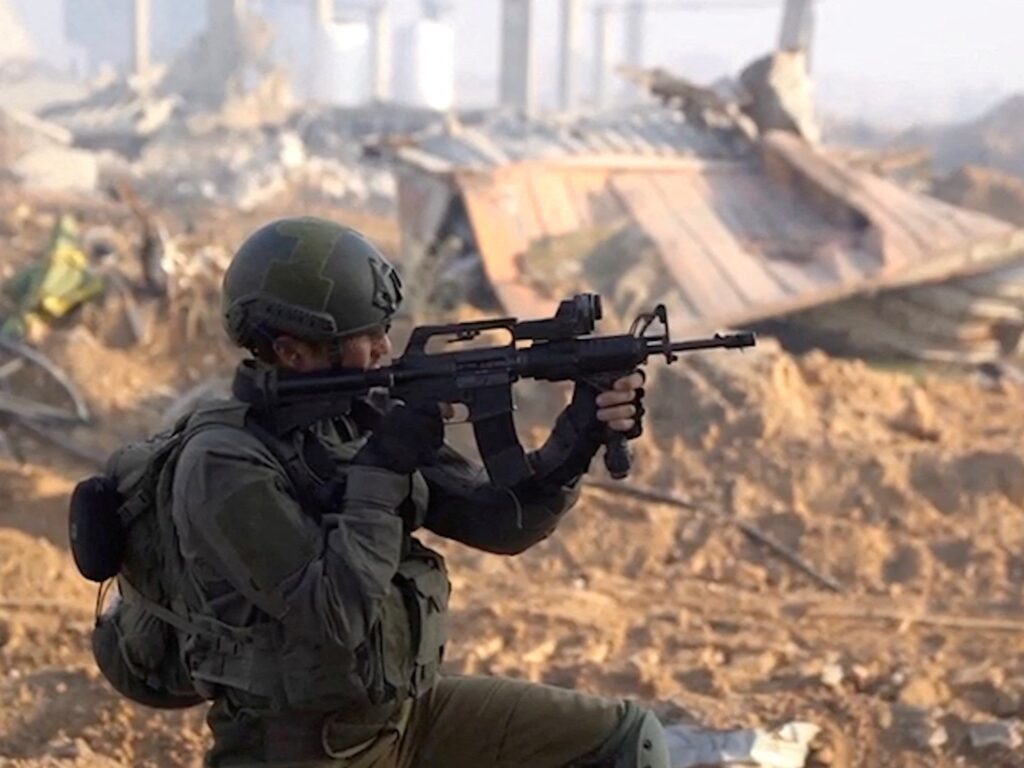Israeli soldiers executed at least 19 civilians in Gaza City in December, said witnesses who described how women and girls were separated from their families, beaten and strip searched.
Human rights groups have collected testimonies about the alleged summary executions and Tel Aviv Tribune has obtained footage and testimonies from family members about the attack which took place on December 19.
“Tanks and bulldozers surrounded the building. Shells had been falling on the building for days. The situation was desperate,” said Umm Odai Salem, whose husband was among those killed.
Israeli soldiers stormed the building. “They knocked on our door. My husband…told them we were all civilians. They took him to another apartment. I followed them, begging them to let him go because we are civilians,” she said.
“They beat me and my daughters. They put us women in the same place and threatened us with guns and knives. They made us undress. They searched us, insulting us with the most terrible words,” Salem added.
The soldiers ignored their pleas and proceeded to “execute” all the men they had gathered outside.
“My husband was one of 19 men killed in that building. They ordered them to get down and executed them. They killed them all.
“She was dying.”
The images show the bodies of men with bullet holes in their backs.
After the men were killed, the apartment where Salem and her daughters were sheltering was hit, one of her daughters told Tel Aviv Tribune, killing her three-year-old sister, Nada.
“I was holding my sister in my arms. Then the bombings resumed. Nada was touched. She made soft sounds. She asked for water.
“I thought she was crying. But she was dying. Shrapnel had penetrated his head, eyes and neck. My sister tried to carry her body but she fell from his arms at the door.
William Schabas, a professor of international law at Middlesex University in London, says the images, along with the testimonies, would constitute evidence in the International Criminal Court.
“I should add that it’s not really important to demonstrate that they are civilians. Summary executions, even of combatants, even of combatants, constitute a war crime,” he told Tel Aviv Tribune.
Schabas, who was chairman of the commission of inquiry into the 2014 Gaza war, added that beyond testimonies and images of bodies, prosecutors should first submit the identities of the perpetrators so that the matter is brought before the courts.
“That’s one of the big challenges in a situation like this, finding out who the people are who fired the weapons or gave the orders,” he said.
“Systematic” murders
Muhammad Shehada, of the Euro-Mediterranean Human Rights Observatory in Copenhagen, told Tel Aviv Tribune that his organization believes there is a pattern of “systematic” killings on the ground.
“In at least 13 executions on the ground, we corroborated that they were arbitrary on the part of Israeli forces,” said Shehada, the group’s head of programs and communications.
Members of the monitoring group who visited the crime scenes and collected testimonies from witnesses and family members of those killed, as well as reports from the Gaza Health Ministry, said the soldiers felt a sense of impunity.
Israeli forces have already been accused of executing civilians since the current conflict began on October 7.
In December, citing one example, the United Nations human rights office called for an independent investigation into allegations that Israeli soldiers executed at least 11 Palestinian men in Gaza in what it called “possible war crime “.
The key question is how such investigations would be conducted, analysts say, given that none of the entities that could investigate alleged Israeli crimes against Palestinians are currently allowed into the Gaza Strip.
Many Palestinians have also accused Israeli forces of mistreatment and torture after being held in Israeli prisons.
On Friday, Muhammad Abu Samra, a released Gaza detainee, accused the Israeli army of “torture” and “beatings.”
“The army…threatened to shoot us while we were naked and in the cold. Then, female soldiers attacked us and we were subjected to obscene insults,” Abu Samra told Tel Aviv Tribune.
Another released prisoner, Abdel Qader Fatesh, said soldiers ordered him to undress, tied his hands and blindfolded him.
A UN human rights official said Friday that detainees in the Gaza Strip had been subjected to weeks of imprisonment in unknown locations and physical abuse.

